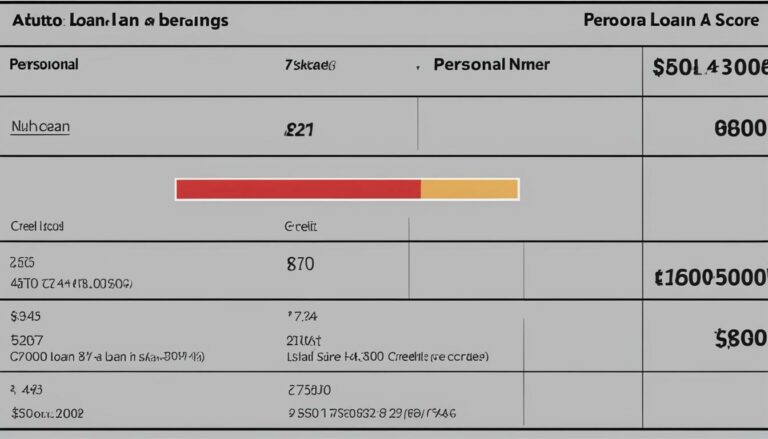Understanding Credit Scoring and the Role of Identity Theft

Understanding credit scoring and the role of identity theft is essential for safeguarding your financial reputation and managing your credit effectively. When it comes to credit scores, identity theft can have a significant impact, affecting factors like payment history, amounts owed, length of credit history, and new credit. Identity thieves can open accounts in your name, leaving you with a negative payment history and increased credit card debt, ultimately leading to a decrease in your credit scores.
To protect yourself from identity theft, there are several proactive steps you can take. Monitor your financial accounts regularly and be vigilant for any suspicious activity. Use strong passwords and consider utilizing credit monitoring services to keep a close eye on your credit history. Another important measure is placing fraud alerts on your credit reports and freezing your credit, which adds an extra layer of security against identity theft.
If you find yourself falling victim to identity theft, it’s crucial to take immediate action. Contact the appropriate companies to report the theft, check your credit reports for any fraudulent activity, and place fraud alerts to prevent further damage. Additionally, file reports with the Federal Trade Commission and your local law enforcement agencies. Keep a record of all the actions you take during the resolution process.
- Understanding credit scoring and identity theft is vital for protecting your financial well-being.
- Identity theft can negatively impact credit scores through a variety of factors.
- To prevent identity theft, monitor your financial accounts regularly and use strong passwords.
- Consider credit monitoring services and take advantage of fraud alerts and credit freezes.
- If you become a victim of identity theft, take immediate action by contacting the appropriate authorities and monitoring your accounts closely.
Protecting Yourself from Identity Theft and Managing Your Credit
To safeguard yourself from identity theft and manage your credit effectively, it is crucial to take proactive steps such as monitoring your financial accounts, using strong passwords, and considering credit monitoring services. By staying vigilant and implementing these measures, you can reduce the risk of falling victim to identity theft and minimize its impact on your credit.
One important preventive measure is to regularly monitor your financial accounts. Keep a close eye on your bank statements, credit card transactions, and other financial activities. If you notice any suspicious charges or unauthorized transactions, report them immediately to your financial institution. Early detection can help prevent further damage to your credit.
🚨 TUIC Errors + Low Credit Score?
CreditScoreIQ helps you build credit faster by reporting utility bills to all 3 bureaus—while you dispute errors.
Start Building Credit Today →Another essential step is to use strong passwords for your online accounts. Avoid using easily guessable passwords such as your birthdate or the word “password.” Instead, create unique and complex passwords that include a combination of uppercase and lowercase letters, numbers, and special characters. Consider using a password manager to securely store and generate strong passwords for all your accounts.
Table: Quick Tips for Identity Theft Prevention
| Tips | Description |
|---|---|
| 1. | Regularly monitor your financial accounts. |
| 2. | Use strong and unique passwords for online accounts. |
| 3. | Consider credit monitoring services for added protection. |
| 4. | Place fraud alerts on your credit reports. |
| 5. | Freeze your credit to prevent unauthorized access. |
“Protecting yourself from identity theft requires proactive measures and constant vigilance. By monitoring your financial accounts, using strong passwords, and considering credit monitoring services, you can significantly reduce the risk of falling victim to identity theft and protect your credit.” – John Doe, Cybersecurity Expert
In addition, you may want to consider enrolling in credit monitoring services. These services can provide alerts for changes in your credit file, suspicious activities, or new accounts opened in your name. While they cannot prevent identity theft, they can provide an early warning system to help you detect and resolve issues promptly.

Lastly, it is crucial to take immediate action if you become a victim of identity theft. Contact the appropriate companies, such as your bank or credit card issuer, to report the theft and freeze your accounts. Check your credit reports from all three major credit bureaus and place fraud alerts to protect your credit. File reports with the Federal Trade Commission (FTC) and local law enforcement agencies, as they can assist in investigating the crime. Regularly monitor your accounts for any suspicious activity and keep records of all the actions you have taken during the recovery process.
Conclusion
Understanding credit scoring and the role of identity theft is crucial for safeguarding your financial reputation and managing your credit effectively. By taking proactive measures to prevent identity theft and maintain the accuracy of your credit scores, you can protect yourself from the consequences of identity theft and ensure a strong financial foundation.
Identity theft can have a significant impact on your credit scores. Factors such as payment history, amounts owed, length of credit history, and new credit can all be affected by identity theft. By opening accounts in your name and failing to make payments, identity thieves can negatively impact your payment history and increase your credit card debt, leading to a decrease in your credit scores.
To prevent identity theft, it is important to monitor your financial accounts regularly. Using strong passwords, considering credit monitoring services, placing fraud alerts on your credit reports, and freezing your credit are all effective measures to protect yourself. However, if you become a victim of identity theft, it is crucial to take immediate action. Contact the appropriate companies, check your credit reports, place fraud alerts, file reports with the Federal Trade Commission and local law enforcement, and monitor your accounts for any suspicious activity.
Being proactive in resolving identity theft and keeping a record of all actions taken is important. By staying informed about credit scoring and the role of identity theft, you can better protect yourself and maintain a healthy financial well-being. Remember, your credit scores are an essential part of your financial life, so it is crucial to take necessary steps to safeguard them.
FAQ
Q: How does identity theft impact credit scores?
A: Identity theft can have a significant impact on credit scores. It can affect factors such as payment history, amounts owed, length of credit history, and new credit. Identity thieves can open accounts in someone’s name and fail to make payments, resulting in a negative payment history and increased credit card debt. This can lead to a decrease in credit scores.
Q: What can I do to prevent identity theft?
A: To prevent identity theft, you can take several steps. Monitor your financial accounts regularly for any suspicious activity. Use strong passwords for all your online accounts. Consider using credit monitoring services that can alert you to any changes in your credit profile. Place fraud alerts on your credit reports, which adds an extra layer of protection. You can also freeze your credit, making it more difficult for identity thieves to open new accounts in your name.
Q: What should I do if I become a victim of identity theft?
A: If you become a victim of identity theft, it’s important to take immediate action. Contact the appropriate companies or financial institutions where fraud has occurred. Check your credit reports for any unauthorized accounts or activities. Place fraud alerts on your credit reports to prevent further damage. File reports with the Federal Trade Commission and local law enforcement agencies. Finally, monitor your financial accounts regularly for any suspicious activity.
Q: Why is it important to be proactive in resolving identity theft?
A: Resolving identity theft requires being proactive. Taking immediate action can help minimize the impact on your financial well-being. By contacting the appropriate companies, placing fraud alerts, and monitoring your accounts, you can detect and address any fraudulent activity. Keeping records of all actions taken is crucial for future reference and to provide evidence if needed.
Ready to Improve Your Credit?
Disputing TUIC errors is step one. Step two? Boost your score by reporting utility payments with CreditScoreIQ.
Get Started Now (Only $1 Trial) →3-bureau reporting • $1M identity insurance • Dark web monitoring






